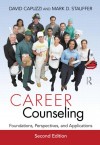 In David Capuzzi and Mark Stauffer’s most recent edition of Career Counseling: Foundations, Perspectives, and Applications, they provide a holistic, comprehensive, insightful, interesting and highly organized (e.g., individual chapter outlines) resource for graduate students and professionals working in the career and mental health counseling fields. Furthermore, the title of this publication accurately describes its purpose, contents and overall themes. For example, the authors provide an extensive historical background on the foundation of career counseling and explain how socio-cultural, economic, and technological changes have influenced current theory and practice. Similarly, the textbook is filled with assessment tools, clinical techniques, case studies, practical examples, and visual guidelines on how to assist special populations (e.g., individuals with disabilities). In addition to the author’s clear writing style, ability to define key terms, and inclusion of helpful sidebars, the text demonstrates the importance of integrating career and mental health concerns.
In David Capuzzi and Mark Stauffer’s most recent edition of Career Counseling: Foundations, Perspectives, and Applications, they provide a holistic, comprehensive, insightful, interesting and highly organized (e.g., individual chapter outlines) resource for graduate students and professionals working in the career and mental health counseling fields. Furthermore, the title of this publication accurately describes its purpose, contents and overall themes. For example, the authors provide an extensive historical background on the foundation of career counseling and explain how socio-cultural, economic, and technological changes have influenced current theory and practice. Similarly, the textbook is filled with assessment tools, clinical techniques, case studies, practical examples, and visual guidelines on how to assist special populations (e.g., individuals with disabilities). In addition to the author’s clear writing style, ability to define key terms, and inclusion of helpful sidebars, the text demonstrates the importance of integrating career and mental health concerns.
The second edition includes eighteen chapters and is organized using the following three sections: (a) foundations for career counseling, (b) skills and techniques, and (c) contextual perspectives on career and lifestyle planning. The initial chapters provide a historical overview, describing theoretical foundations and emphasizing a holistic perspective. One useful chapter discusses the need for multicultural and social justice competence while another chapter reviews ethical, legal and accreditation standards. Topics related to conducting individual and group assessment, utilizing technology in practice, creating career action plans, implementing and designing career programs, and engaging in supervision are addressed over five chapters. Finally, the remaining chapters focus on career and lifestyle planning for specific populations (e.g., middle school students; dual-career families; drug users).
Incorporating contributions from more than thirty-five experts in the counseling, career, school, and social work disciplines, Capuzzi and Stauffer provide comprehensive information that was empirically supported and highly applicable to current trends in the career counseling field (e.g., dual career couples). Furthermore, this text included powerful statistics that concurrently ensured the depth, breadth, and currency of all sources cited. Also, descriptive case studies (e.g., chapter 6), additional website links (e.g., chapter 9), and visual graphs and tables (chapter 15) are used throughout the textbook to enhance clarity and understanding among its audience. Additional strengths are related to the addressing of gaps within the literature describing special populations, such as integrating principles of personal and career counseling with anxiety, and depression that often interfere with making career decisions. Similarly, Capuzzi and Stauffer note how career theories (e.g., Hershenson’s model of work adjustment) can be used for individuals with disabilities who present with poor self-concept. Finally, the authors adequately address the multiple roles of career counselors (e.g., consultants, practitioners, and program managers) and how to use strategic planning when developing career programs.
While Capuzzi and Stauffer’s textbook included numerous strengths, the publication was not without some limitations. One area for improvement is expanding content and information displayed in the sidebar sections. For example, potential answers to questions could be included at the end of each chapter so that the reader can compare responses. While talking about social justice, access and equity, it would be beneficial to discuss cost-effective service delivery models that can be used when working with clients seeking services. Finally, adding examples, role plays or additional information could have strengthened the supervision chapter.
In summary, Career Counseling: Foundations, Perspectives, and Applications (2012) demonstrates how theory can be translated into practice. It represents a comprehensive and valuable resource that significantly contributes to the field of career and mental health counseling. Whether for first-year graduate students or advanced professionals in the field, this text will serve as a useful resource that can be used across a variety of client populations and presenting concerns.
Capuzzi, D. & Stauffer, M. (2012). Career counseling: Foundations, perspectives, and applications (2nd Ed.) New York, NY: Routledge.
Review by: Mary-Catherine McClain, Florida State University Career Center.
The Professional Counselor Journal
